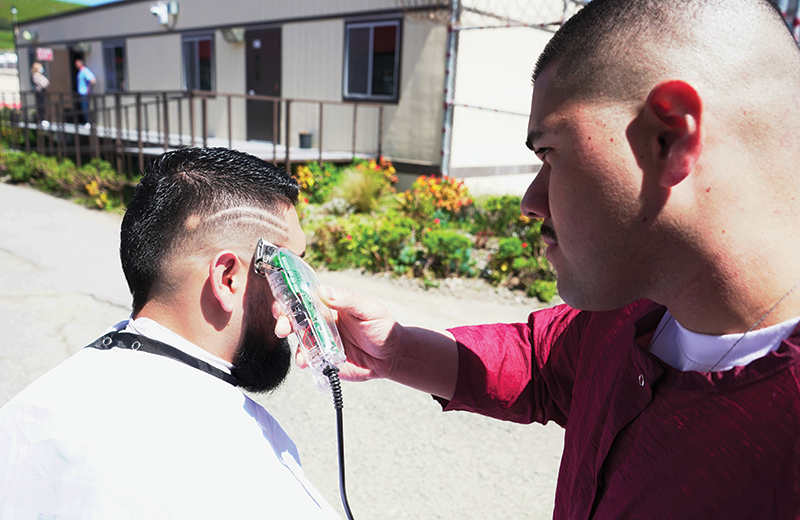Edgar J. Rodriguez cuts hair while his apprentice, Manuel Mena, sweeps the shop. The client in the chair beams with delight as he looks in the mirror at his exceptional haircut, making him look and feel good, ready to succeed.
These two barbers, the teacher and the apprentice, are full of enthusiasm and passion for what they consider a blessing from God — their talent to perform top-notch haircuts and help people on a deeper level in the process. The teacher and the apprentice are residents of San Quentin’s Alpine housing unit.
“Nowadays you can find many good barbers, but these two barbers go deeper than just cutting someone’s hair, they see this as a tool to reintegrate in society,” said Aristeo Sampablo, one of their customers.

Rodriguez said that when he was 15 years old, “I was ignited with the interest in the barber world. I wasn’t very good at first, but I was always observant when I got my hair cut at the local barbershop.”
He recalled how he started cutting his brother’s hair, then his dad’s, and before he knew it, he was cutting everyone’s hair in the neighborhood.
Rodriguez’s skill and techniques are self-evident. While he does not consider himself a perfectionist, others may think otherwise.
“Above all, my motivation is to be very good at what I do, but most importantly, staying humble,” he said.
Usually his clients ask him to cut their hair, but sometimes he starts that conversation. “I can’t see a peer looking like a caveman,” he joked.
In order to stay organized, Rodriguez has a notebook with dates and times so his clients can set an appointment. Once in his book, no one escapes without a haircut.
The most popular hairstyles are razor fades, tapers and comb overs. However, he likes to push the limits, such as when he performed a faux-mohawk, razor blend with a swift design on each side for one of his fellow residents in Alpine.
“When you look good, you feel good,” Rodriguez said about how his skill helps the rehabilitation of his fellow residents. “A good haircut has the power to boost someone’s confidence, self-esteem and motivation. They tend to be more inclined to conquer [their challenges] and have an outlook of success.”
He is always open to having a good conversation with his peers when they sit in his barber’s chair.
“My barbershop is a place where everyone is welcome. I find myself [being] expressive when I cut my clients’ hair. Frequently I am the one that learns a lot from the people around me, which helps me grow as a real man,” he said.
Rodriguez feels that cutting hair is also therapeutic for him.
“When I cut hair … I am no longer in prison, I’m in my community,” he said.
Rodriguez would love to see a barber certification program here at San Quentin, like the one they have at Valley State Prison.
According to him, this program would open many doors for countless residents of San Quentin who would benefit from such vocational training and certification. This would give them legitimate tools to assist in their successful reentry back into society. He has faith that the vision and transformation of San Quentin into a true rehabilitation center can soon make this wish a reality.
One person that Rodriguez is helping to give such skills to is his apprentice, Mena.
“Early in my childhood, I used to listen to stories from my grandfather’s friends, about [how] he used to cut their hair and I [would] think that I wanted to be like him,” Mena said. “I thank God for answering my prayer by bringing Edgar to my life, so he could teach me how to cut hair. Now I can be like my grandfather”.
When Mena sees his clients with unkempt hair, he recommends a haircut and makes himself available anytime during the day. His policy is “first come, first served.”
He enjoys how his clients feel when he finishes cutting their hair, because they tell him, “It came out very good. I think I have a new barber now.”
Mena said his favorite haircut is the “comb-over fade.”
He likes his patrons to look presentable for their pictures so when their loved ones come to visit, they will find them handsome without the wrong kind of surprise.
Mena would love to be able to get his barber license or certificate so he can work as a barber when he returns to the community. “There are two barbershops that are offering me a job, but they want me to have a license or certificate,” he said.
Until that day comes, Mena and Rodriguez will continue to hone their skills and help their peers’ journey to rehabilitation be a bit smoother.
―Adan Arriaga contributed to this story.